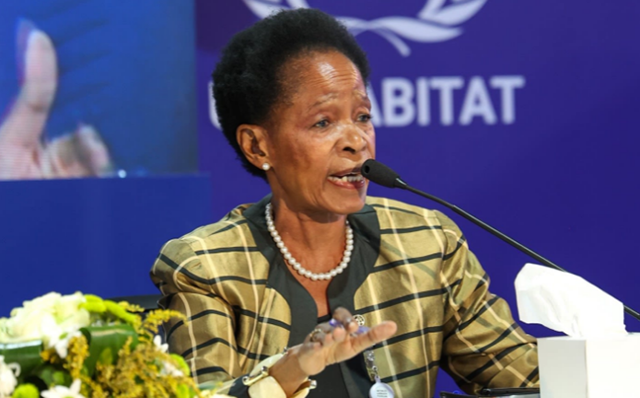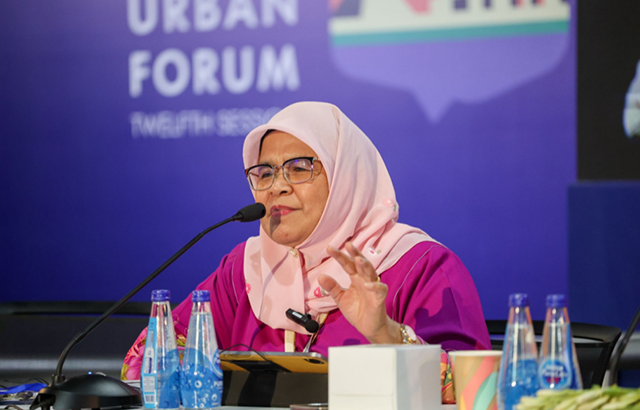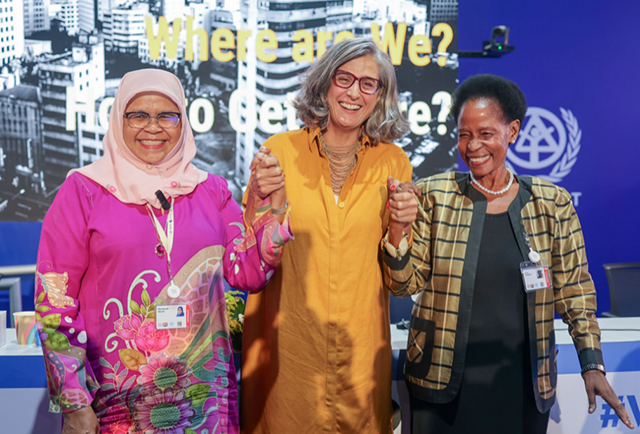



photo by Zhao Shengbo
Cairo, 6 November 2024-At the twelfth session of the World Urban Forum in Cairo, UN-Habitat hosted a unique roundtable discussion where Executive Director Anacláudia Rossbach engaged in a dialogue with former Executive Directors Maimunah Mohd Sharif and Anna Tibaijuka. The session, themed “The New Urban Agenda: Where are we, how to get there?” offered an intergenerational look at the journey, achievements, and challenges of the New Urban Agenda as it nears its ten-year midpoint. With an audience of international stakeholders, local governments, and urban experts, the leaders underscored the Agenda’s central role as an accelerator for sustainable urban development, paving the way for resilient, inclusive, and thriving cities worldwide.
The New Urban Agenda’s foundation and global vision
Since its adoption at Habitat III in Quito, Ecuador, in 2016, the NUA has guided countries and cities striving for sustainable urbanization. It underpins SDG 11 - making cities inclusive, safe, resilient, and sustainable - and frames urban development as a solution to global challenges like climate change, poverty, and inequality.

UN-Habitat Executive Director Anacláudia Rossbach [Source: UN-Habitat/Peter Ndolo]
Reflecting on the challenges ahead, Rossbach opened the session, acknowledging that “We haven’t overcome poverty and structural inequality.” She added: “The New Urban Agenda is complex. […] Key messages and principles need to be distilled.”
Financing sustainable urban development: A persistent challenge
Former Executive Director Anna Tibaijuka emphasized the critical role of finance: “The main challenge is financing - housing is fundamentally an investment issue, making it a financial issue.”

Former Executive Director Anna Tibaijuka [Source: UN-Habitat/Peter Ndolo]
Tibaijuka, who led UN-Habitat from 2000 to 2010, noted the importance of measurable indicators to assess progress, especially given the varied stages of urbanization across regions.
“People are moving to cities, but the cities are ill-prepared. Governments must build environments in which people can thrive,” she stressed, adding that action must take place at the grassroots level where people live, to support the “right to the city” for young people.
Learning from Covid-19: Building resilience in urban systems
Former Executive Director Maimunah Mohd Sharif, who led UN-Habitat through the COVID-19 pandemic, noted how the crisis underscored systemic failures.

Former Executive Director Maimunah Mohd Sharif [Source: UN-Habitat/Peter Ndolo]
“To provide immediate relief, we introduced safety nets and emergency measures during the pandemic. But why weren’t these measures put in place before. […] Why do we need a COVID-19 to realize that communities need help?” she asked, urging for more resilient urban systems.
During the pandemic, UN-Habitat reached over 11 million people with emergency resources in over 64 countries, demonstrating the importance of adaptable infrastructure.
Sharif also highlighted the need for a holistic view, stating, “The future is urban, urbanization is unstoppable. We need to see climate change and sustainable urbanization as a whole.”
Bridging policy and resources
On the topic of WUF12, Sharif reflected: “It all starts at home, but if you have no home, where do you start?” She stressed that housing must be “accessible, affordable, and adequate,” underscoring that urban development needs both “software” - policy, government leadership, and governance - and “hardware” - technology, resources, and finance.
“Enough declarations; we need action,” she remarked. “Where is the financing and commitment to implement policies?”
The World Urban Forum’s legacy and the path forward
Tibaijuka recalled the establishment of the World Urban Forum in 2002, which she said was a response to the need to raise awareness about rapid urbanization.
“I saw the transition from homo sapiens to homo urbanus,” she stated, noting that urbanization in Africa, in particular, is happening but often in an unplanned manner, which requires urgent action and dedicated funding.
Unlocking finance and building capacity for the future
Looking ahead, the panellists agreed that increased financing, capacity-building, and stronger partnerships are essential to achieve the New Urban Agenda’s goals.
Sharif emphasized: “We need to be optimistic. Cities must work together with philanthropies, the private sector, and communities to achieve the SDGs and the New Urban Agenda.”
She advocated for the Cities Investment Facility, a UN-Habitat initiative that aims to mobilize over USD 250 million for urban projects focused on affordable housing, clean energy, and public spaces. This initiative supports cities that often lack the capacity to develop bankable projects, allowing them to unlock finance for transformative urban projects.

UN-Habitat Executive Director Anacláudia Rossbach (centre) and UN-Habitat former Executive Directors Maimunah Mohd Sharif (left) and Anna Tibaijuka (right) [Source: UN-Habitat/Peter Ndolo]
Strategic partnerships for sustainable urbanization
As the session concluded, Tibaijuka reiterated the need for strategic partnerships, finance, and awareness to drive the New Urban Agenda forward.
“Unlocking finance is essential,” she remarked, urging donors and Member States to increase their support.
As the New Urban Agenda approaches its ten-year milestone in 2026, insights from this WUF12 session will contribute to the 2026 quadrennial report, which will assess global progress and recalibrate priorities. Despite ongoing challenges, the Forum underscored that with renewed local actions, robust financing, and strong partnerships, cities worldwide can accelerate their journey toward realizing the New Urban Agenda’s vision of sustainable, inclusive urban development.
Source:
https://unhabitat.org/news/06-nov-2024/how-do-we-get-there-insights-from-wuf12-on-urban-futures